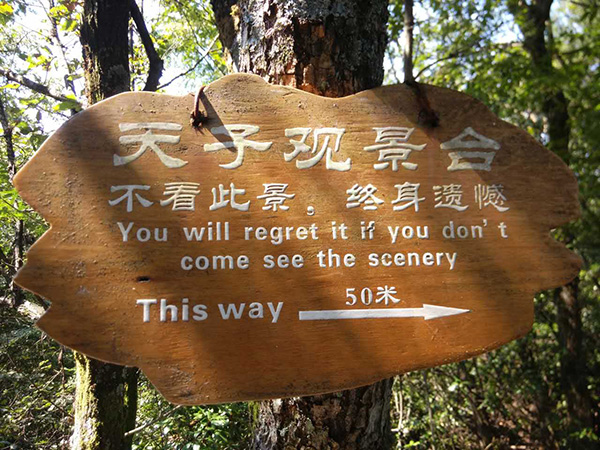


Fancy a Kindle? Take the Long March quiz
 |
|
The sign on the way to a viewing platform in Zhangjiajie in Hunan province. [Photo provided to chinadaily.com.cn] |
The sign was hilarious.
Nailed to a tree, it proclaimed to anyone who passed that they "will regret it if (they) don't come see the scenery." The tag line, seemingly ripped from an advertisement or brochure, made it feel as though the park was speaking directly to me, and giving me a hard sell. The sign was surreal, but it was also right.
As I peeked out over the ledge on the viewing platform, I was blown away by the scale and alien majesty of Zhangjiajie. The spires of rock jutted out like spines of some hidden, slumbering beast. It was by far one of the most bizarre and beautiful landscapes I had ever seen.
Unfortunately, I wasn't there on holiday; I was traveling as part of my first Long March Press Tour earlier this year. We came to Zhangjiajie to not only take in the amazing scenery, but also see the impact tourism has had on the local economy. Our group of reporters talked with vendors, drivers, and tour guides, all of whose jobs depended on visitors to this geological wonder.
Tourism can be a huge asset for a national or regional economy. The United Nations' World Tourism Organization says tourism accounts for 5 percent of the world's GDP, provides one in 12 jobs worldwide, and is the first or second largest source of export revenue for 20 of the world's 48 least developed countries.
Chinese tourists are some of the biggest providers of international tourism revenue. According to the China National Tourism Board, 120 million Chinese traveled overseas last year, spending 684 billion yuan ($104.5 billion) as they did it. And now China's policymakers are looking to harness the power of tourism to help boost the country's poorest regions.
The goal, as outlined by Premier Li Keqiang during an international tourism conference in Beijing this May, is to raise 12 million people out of poverty via tourism in the next five years. To do this, the government will continue to improve roadways, subsidize construction of tourism necessities, and provide advisory support for rural tourism efforts. This will hopefully draw more people, both from domestic and international populations, to less-traveled portions of China's vast countryside.
This call to travel has really resonated with me. I had already visited many places in China, but after moving to Beijing I stopped traveling within the country as much as I had before. Since my trip to Zhangjiajie I've revisited Xi'an, explored a new (to me) portion of the Great Wall, and experienced the twisting roads and breathtaking landscapes of Gansu province. There is a lot out there, and by exploring more of rural China it will not only be good for my wanderlust but also the communities I visit.
